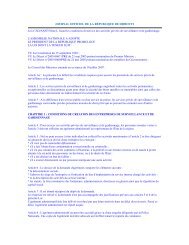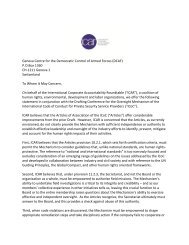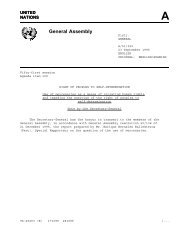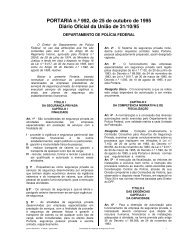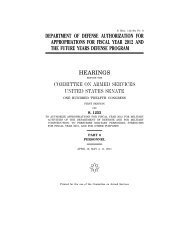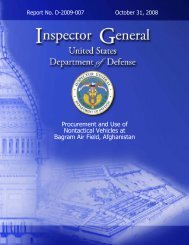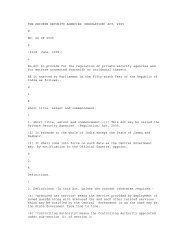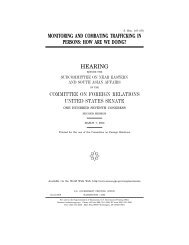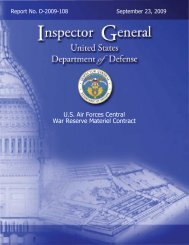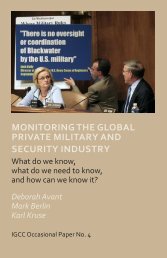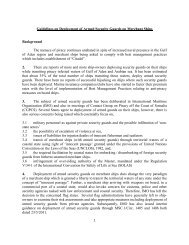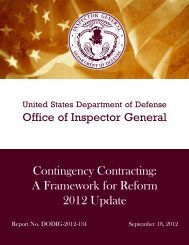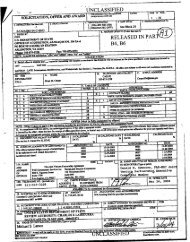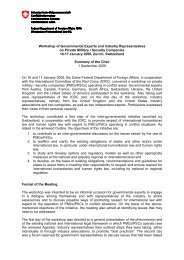Security Assistance; and Logistics - Federation of American Scientists
Security Assistance; and Logistics - Federation of American Scientists
Security Assistance; and Logistics - Federation of American Scientists
Create successful ePaper yourself
Turn your PDF publications into a flip-book with our unique Google optimized e-Paper software.
• Ministry <strong>of</strong> Defense Administration – Policy on Ammunition ManagementProcedures within the Iraqi Armed Forces, 15 Jun 2006 (Unsigned draft)• Ministry <strong>of</strong> Defense Contracting Policy <strong>and</strong> Procedures, 19 Jun 2006 (Unsigneddraft)• Ministry <strong>of</strong> Defense Administration – Procedures on Maintenance Support, 6 Sep2006 (Unsigned draft)• Ministry <strong>of</strong> Defense Administration - Maintenance Support, 30 Sep 2006(Unsigned draft)• Ministry <strong>of</strong> Defense Administration – Policy on Issuing <strong>of</strong> Fuel <strong>and</strong> Lubricantswithin the Iraqi Armed Forces, 25 Oct 2006 (Unsigned draft)• Iraqi Supply H<strong>and</strong>book (undated, unsigned document)Official <strong>Logistics</strong> Guidance NeededThe Coalition had provided mentors <strong>and</strong> trainers for the Iraqi MoD <strong>and</strong> Army since 2003.One <strong>of</strong> the goals <strong>of</strong> that initiative had been to transform the Iraqi logistics processes into awestern model, building on the elements <strong>of</strong> a U.K. system which had been previouslyinstituted. Often, the goal <strong>of</strong> establishing a self-sustaining logistics capability had taken aback seat to growing <strong>and</strong> fielding the army as a viable counterinsurgency force.By 2006, MNF-I had developed a plan jointly agreed with the MoD <strong>and</strong> JHQ fordeveloping the Iraqi Army logistics capability, but that plan never materialized in the face<strong>of</strong> a growing counterinsurgency effort <strong>and</strong> an eventual change in Iraqi focus with respectto its logistics strategy. The U.S. Mission-Iraq <strong>and</strong> MNF-I Joint Campaign Plan <strong>of</strong>November 2007 made development <strong>of</strong> the Iraqi logistics capability a top priority again.Despite the subsequent renewed efforts by the Coalition to develop the sustainmentcapability <strong>of</strong> the Iraqi Army, some U.S. advisors expressed concern over the lack <strong>of</strong><strong>of</strong>ficial Iraqi MoD guidance that detailed the Iraqi logistics doctrine <strong>and</strong> procedures. One<strong>of</strong> the advisors interviewed stated that:“The Iraqi (logistics) chain <strong>of</strong> comm<strong>and</strong> is convoluted <strong>and</strong> confused.We think in terms <strong>of</strong> one structure, but they have something entirelydifferent. We are imposing an <strong>American</strong> system on the Iraqis, <strong>and</strong> nowwe are saying that we must develop their logistics capability using the‘Iraqi way.’ The problem is – what is the Iraqi way?”The assessment team was unable to find any <strong>of</strong>ficial Iraqi document that broadlyspecified the Iraqi logistics doctrine or processes. Unlike U.S. practice, Iraqi leaders tendto establish policy <strong>and</strong> procedure by memor<strong>and</strong>um. We were able to discover severalIraqi policy memor<strong>and</strong>a that prescribed basic procedures for accomplishing certain tasks.U.S. logistics mentors, however, must cobble together many such memor<strong>and</strong>a in order tocreate a picture <strong>of</strong> what is the <strong>of</strong>ficially sanctioned Iraqi logistics system.86



